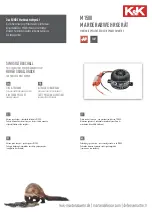
PK-232 TECHNICAL MANUAL
APPENDIX A – AX.25 LEVEL 2 PROTOCOL
PK232TM Rev. A 5/87
A-19
Page 64
A.4.3.4.4
When the DXE enters the disconnected state after an error condition or if an internal error has re-
sulted in the DXE being in the disconnected state, the DXE should indicate this by sending a DM
response rather than a DISC frame and follow the link disconnection procedure outlined in
A.4.3.3.3
, above. The DXE may then try to re-establish the link using the link set-up procedure
outlined in
A.4.3.1
, above.
A.4.3.5
Collision Recovery
A.4.3.5.1
Collisions in a Half-Duplex Environment
Collisions of frames in a half-duplex environment are taken care of by the retry nature of the T1
timer and retransmission count variable. No other special action needs to be taken.
A.4.3.5.2
Collisions of Unnumbered Commands
If sent and received SABM or DISC command frames are the same, both DXEs should send a UA
response at the earliest opportunity, and both devices should enter the indicated state.
If sent and received SABM or DISC commands are different, both DXEs should enter the discon-
nected state and transmit a DM frame at the earliest opportunity.
A.4.3.5.3
Collision of a DM with a SABM or DISC
When an unsolicited DM response frame is sent, a collision between it and a SABM or DISC may
occur. In order to prevent this DM from being misinterpreted, all unsolicited DM frames should be
transmitted with the F bit set to zero. All SABM and DISC frames should be sent with the P bit set
to one. This will prevent any confusion when a DM frame is received.
A.4.3.6
Connectionless Operation
In Amateur Radio, there is an additional type of operation that is not feasible using level 2 connec-
tions. This operation is the round table, where several amateurs may be engaged in one conversa-
tion. This type of operation cannot be accommodated by AX.25 link-layer connections.
The way round-table activity is implemented is technically outside the AX.25 connection, but still
using the AX.25 frame structure.
AX.25 uses a special frame for this operation, called the Unnumbered Information (UI) frame.
When this type of operation is used, the destination address should have a code word installed in
it to prevent the users of that particular round table from seeing all frames going through the
shared RF medium. An example of this is if a group of amateurs are in a round-table discussion
about packet radio, they could put PACKET in the destination address, so they would receive
frames only from others in the same discussion. An added advantage of the use of AX.25 in this
manner is that the source of each frame is in the source address subfield, so software could be
written to automatically display who is making what comments.
Since this mode is connectionless, there will be no requests for retransmissions of bad frames. Col-
lisions will also occur, with the potential of losing the frames that collided.
A.4.4
Procedures for Information Transfer
Once a connection has been established, as outlined above, both devices are able to accept I, S,
and U frames.
Summary of Contents for PAKRATT PK-232
Page 75: ...PK 232 TECHNICAL MANUAL APPENDIX C DRAWINGS PK232TM Rev A 5 87 C 1 Page 75 ...
Page 76: ...PK 232 TECHNICAL MANUAL APPENDIX C DRAWINGS PK232TM Rev A 5 87 C 2 Page 76 ...
Page 77: ...PK 232 TECHNICAL MANUAL APPENDIX C DRAWINGS PK232TM Rev A 5 87 C 3 Page 77 ...
Page 78: ...PK 232 TECHNICAL MANUAL APPENDIX C DRAWINGS PK232TM Rev A 5 87 C 4 Page 78 ...
Page 79: ...PK 232 TECHNICAL MANUAL APPENDIX C DRAWINGS PK232TM Rev A 5 87 C 5 Page 79 ...
Page 80: ...PK 232 TECHNICAL MANUAL APPENDIX C DRAWINGS PK232TM Rev A 5 87 C 6 Page 80 ...
Page 81: ...PK 232 TECHNICAL MANUAL APPENDIX C DRAWINGS PK232TM Rev A 5 87 C 7 Page 81 ...
Page 82: ...PK 232 TECHNICAL MANUAL APPENDIX D Waveforms PK232TM Rev A 5 87 D 1 Page 82 ...
Page 83: ...PK 232 TECHNICAL MANUAL APPENDIX D Waveforms PK232TM Rev A 5 87 D 2 Page 83 ...
Page 84: ...PK 232 TECHNICAL MANUAL APPENDIX D Waveforms PK232TM Rev A 5 87 D 3 Page 84 ...
Page 85: ...PK 232 TECHNICAL MANUAL APPENDIX D Waveforms PK232TM Rev A 5 87 D 4 Page 85 ...
Page 86: ...PK 232 TECHNICAL MANUAL APPENDIX D Waveforms PK232TM Rev A 5 87 D 5 Page 86 ...
Page 87: ...PK 232 TECHNICAL MANUAL APPENDIX D Waveforms PK232TM Rev A 5 87 D 6 Page 87 ...
Page 88: ...PK 232 TECHNICAL MANUAL APPENDIX D Waveforms PK232TM Rev A 5 87 D 7 Page 88 ...
Page 89: ...PK 232 TECHNICAL MANUAL APPENDIX D Waveforms PK232TM Rev A 5 87 D 8 Page 89 ...
Page 90: ...PK 232 TECHNICAL MANUAL APPENDIX D Waveforms PK232TM Rev A 5 87 D 9 Page 90 ...
Page 91: ...PK 232 TECHNICAL MANUAL APPENDIX D Waveforms PK232TM Rev A 5 87 D 10 Page 91 ...
Page 92: ...PK 232 TECHNICAL MANUAL APPENDIX D Waveforms PK232TM Rev A 5 87 D 11 Page 92 ...
Page 93: ...PK 232 TECHNICAL MANUAL APPENDIX D Waveforms PK232TM Rev A 5 87 D 12 Page 93 ...
Page 94: ...PK 232 TECHNICAL MANUAL APPENDIX D Waveforms PK232TM Rev A 5 87 D 13 Page 94 ...
Page 95: ...PK 232 TECHNICAL MANUAL APPENDIX D Waveforms PK232TM Rev A 5 87 D 14 Page 95 ...
Page 96: ...PK 232 TECHNICAL MANUAL APPENDIX D Waveforms PK232TM Rev A 5 87 D 15 Page 96 ...
Page 97: ...PK 232 TECHNICAL MANUAL APPENDIX D Waveforms PK232TM Rev A 5 87 D 16 Page 97 ...
Page 98: ...PK 232 TECHNICAL MANUAL APPENDIX D Waveforms PK232TM Rev A 5 87 D 17 Page 98 ...
Page 99: ...PK 232 TECHNICAL MANUAL APPENDIX D Waveforms PK232TM Rev A 5 87 D 18 Page 99 ...
Page 100: ...PK 232 TECHNICAL MANUAL APPENDIX D Waveforms PK232TM Rev A 5 87 D 19 Page 100 ...
Page 101: ...PK 232 TECHNICAL MANUAL APPENDIX D Waveforms PK232TM Rev A 5 87 D 20 Page 101 ...
















































